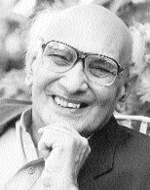Latest
01:54 PM

Journalist, writer and political activist, Abdullah Malik wrote in his book Purani Mehfilain Yaad aa Ra’hi Ain: “I can declare with pride that I have spent my entire life wedded to the same commitment, the same set of beliefs, namely the establishment one day of a socialist Pakistan…it will be a message of love for mankind, a message that transcends all religions, faiths and creeds.”
According to Malik, he was born “in the last years of the second decade of the 20th century, on 20 October 1920 in Lahore’s Koocha Chabukswaran, which was located in the heart of the city.” He got his early education from the Mission High School and graduated from the Islamia College.
Attracted to leftist politics, Malik joined the Communist Party newspaper, the Jang-i-Azadi. He also wrote treatises on capitalism and feudalism.
After working for a while for Qaumi Jang that was also translated in English as People’s War, Malik joined the agitational politics of the Majlis-i-Ahrar. He attended the first Communist Party Conference held in Bombay in 1943.
On the instructions of the party hierarchy, Malik along with a few other members joined the All India Muslim League (AIML). They were responsible for formulating the Punjab Muslim League’s manifesto which promised radical agrarian reforms and complete nationalization of transport and industry.
After partition, Malik chose to live in Pakistan. He was appointed editor of the government newspaper, Muhajirin. While he was working for the Urdu daily Imroze, Malik was dismissed by military ruler General Yayha Khan for his severe criticism of the military action taken in East Pakistan, for which he was imprisoned. He was also sentenced to lashes for writing an article against hanging of a former prime minister of Bangladesh Mujeebur Rehman. However, later the sentence was withdrawn.
According to Khalid Hasan, “Abdullah Malik was a one-man movement of action and ideas. There was no one quite like him – and those who knew him would confirm that it was so.”
Apart from working for several prestigious newspapers that included dailies Azad, The Pakistan Times, and Nawa-i-Waqt, Malik was also a prolific writer, writing extensively on literature, politics and the independence movement. He authored over two dozen books. Most of them were written on the history of Punjab and political movements in the subcontinent.
After a protracted illness, he died on April 9, 2003 in Islamabad.
Sources: khalidhasan.net, the Oxford Companion to Pakistan History; Dawn

 Why me?
Why me?If my call is so important to them, why don’t they answer it for 22 minutes?
How come when I want to, but something specific online is the only item out of stock.
When I get into a queue or lane going fast, the moment I get in, it becomes the slowest and refuses to budge.
Read more... | Archives